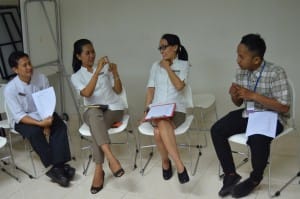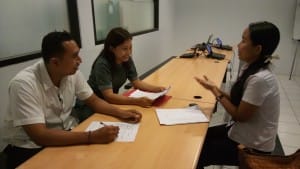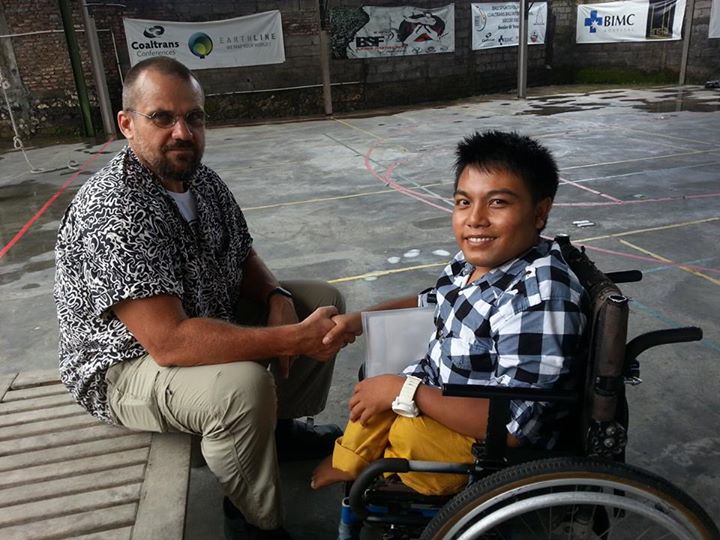Job opportunities for disabled people in Indonesia may be hard to come by. But non-profit organization DNetwork proves that people with disabilities have equal rights in any professional setting.
Oftentimes people with disabilities in Indonesia are misunderstood and mistreated, with many still believing that jobs should only be for able-bodied people. However, many people with disabilities succeed in graduating from universities and work in formal sectors. Notwithstanding such successes, disabled people in Indonesia still struggle to make their way into a career path. Not only do people with physical or mental disabilities lack accessibility and opportunities, they are still seen by many as a burden.
As Suri Filan, Project Coordinator for DNetwork laments, “Nowadays, the work environment for people with disabilities is still far away from the word ‘friendly’. People with disabilities are still commonly seen as a cost, not an asset.”
In 2013, the number of disabled people in Indonesia who were unemployed reached approximately 13 million. They were not getting enough work opportunities, partly because there was no platform to provide job information specifically for those with disabilities. For that reason, DNetwork was established to support disabled job-seekers.
Based in Bali, the global jobs network liaises with employers and potential job-seekers. “We act as a consultant for the employers and the job-hunter with disabilities should they want to know more about disabilities and the workplace,” Suri says.
To get involved in DNetwork, applicants need simply register on their website and fill in all the details required. Once received and confirmed, DNetwork will approve their account. Afterwards, the job-seekers are allowed to access all work information presented on the website and have the chance to apply directly to employers.
The non-profit organization educates employers about working with disabled people; the proper way of conducting an interview; providing training of basic sign language; and making assessment visits to companies to identify the appropriate positions for potential job-seekers. DNetwork also helps applicants who are less familiar with using the Internet, making a CV, and other application procedures. This way, they are supported with all the knowledge required to apply for a job and employers become aware of disabled people’s rights as professionals.
DNetwork strives to educate that people with disabilities have equal rights to work opportunities as able-bodied people. They deserve to be treated with respect and belong to a positive environment – and this also applies in the workplace. “They have the right to get the friendly workplace [sic], at least if you cannot provide an access room or facilities, you can build a great team who have the sensitivity towards disabilities,” Suri says.
Alongside working opportunities, they also have the rights to proper education, an inclusive school, and care from the government, which should be translated into providing public facilities like toilets, disabled parking bays, ramps for wheelchairs and more.
To put things into perspective, the main problem in this case is twofold. Firstly, society’s lack of support evidently stifles access to jobs for disabled people. Secondly, although not in all cases, some disabled people learn that their disabilities are a constraint for them to succeed. Suri, however, refutes that idea but can also see that negative stereotyping does play a role.
“‘The disabilities are the barriers’ is only in our minds and it depends on how we see and understand what the disability is. What is happening in our country and society nowadays is a misunderstanding about the disabilities which causes negative stereotypes,” Suri argues.
Suri also notices that in the last year Indonesia has been improving its support of disabled people, especially by the government. She found that in 2015, the government has paid more contributions to disability issues, especially related to employment. “They have started to collaborate with NGOs and also with DNetwork to discuss how to solve the problem and have started to hold events related with disability issues,” Suri says.
Although Suri thinks that the fight for disabled people’s rights still continues in aspects other than work opportunities, DNetwork has demonstrated tremendous progress in deconstructing negative stereotypes about people who live with disabilities. The organization teaches the public that they not only share equal rights with those who are able-bodied in a workplace, but also that they are entitled to a fulfilling life.
As equals, Suri sees no special advice needed for disabled people who might be unsure of themselves when choosing the right job or career path. She says, “It is just the same as people with able-bodies; just choose what they want or are happy to do and be confident!”
For more information please visit DNetwork’s website at www.dnetwork.net




